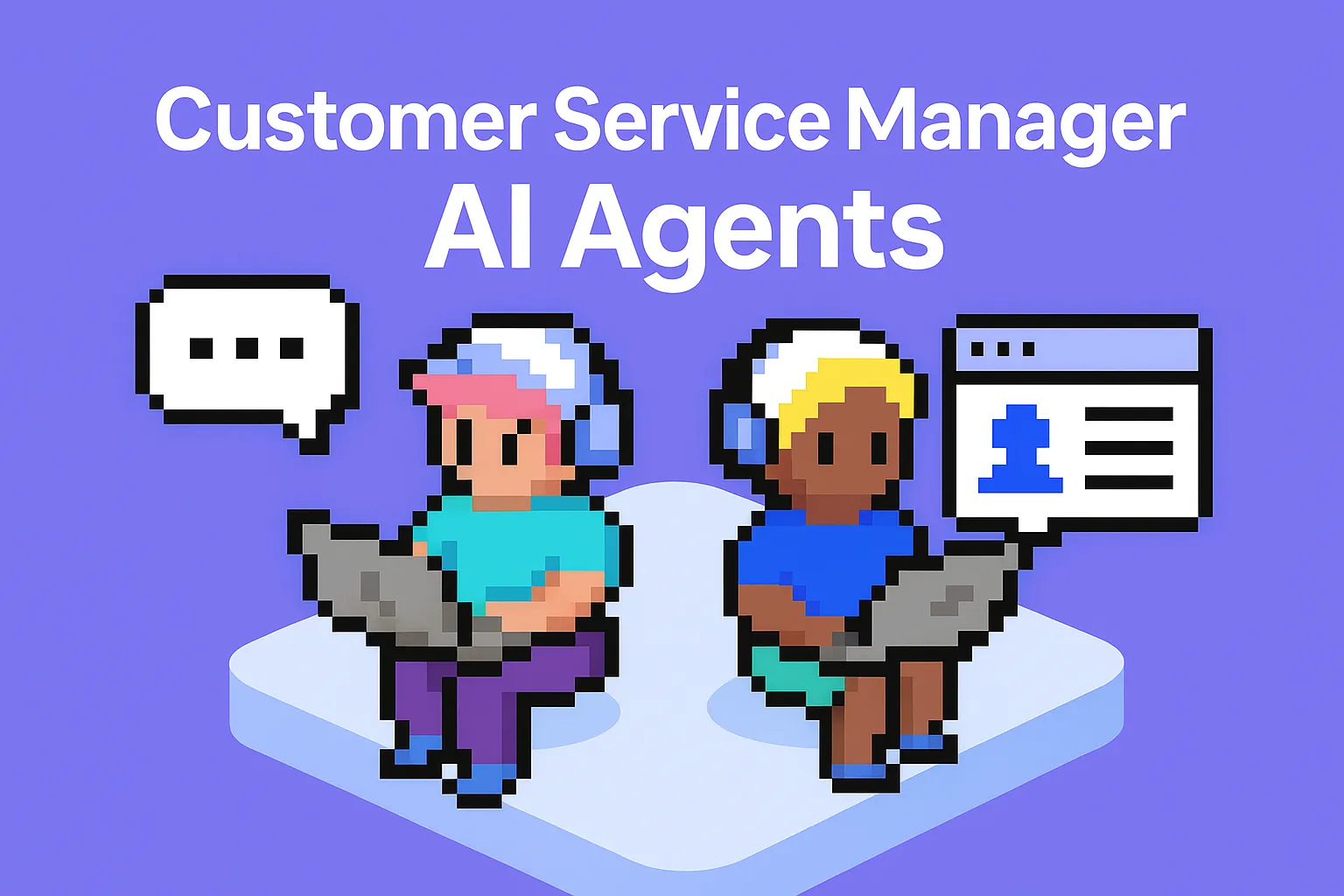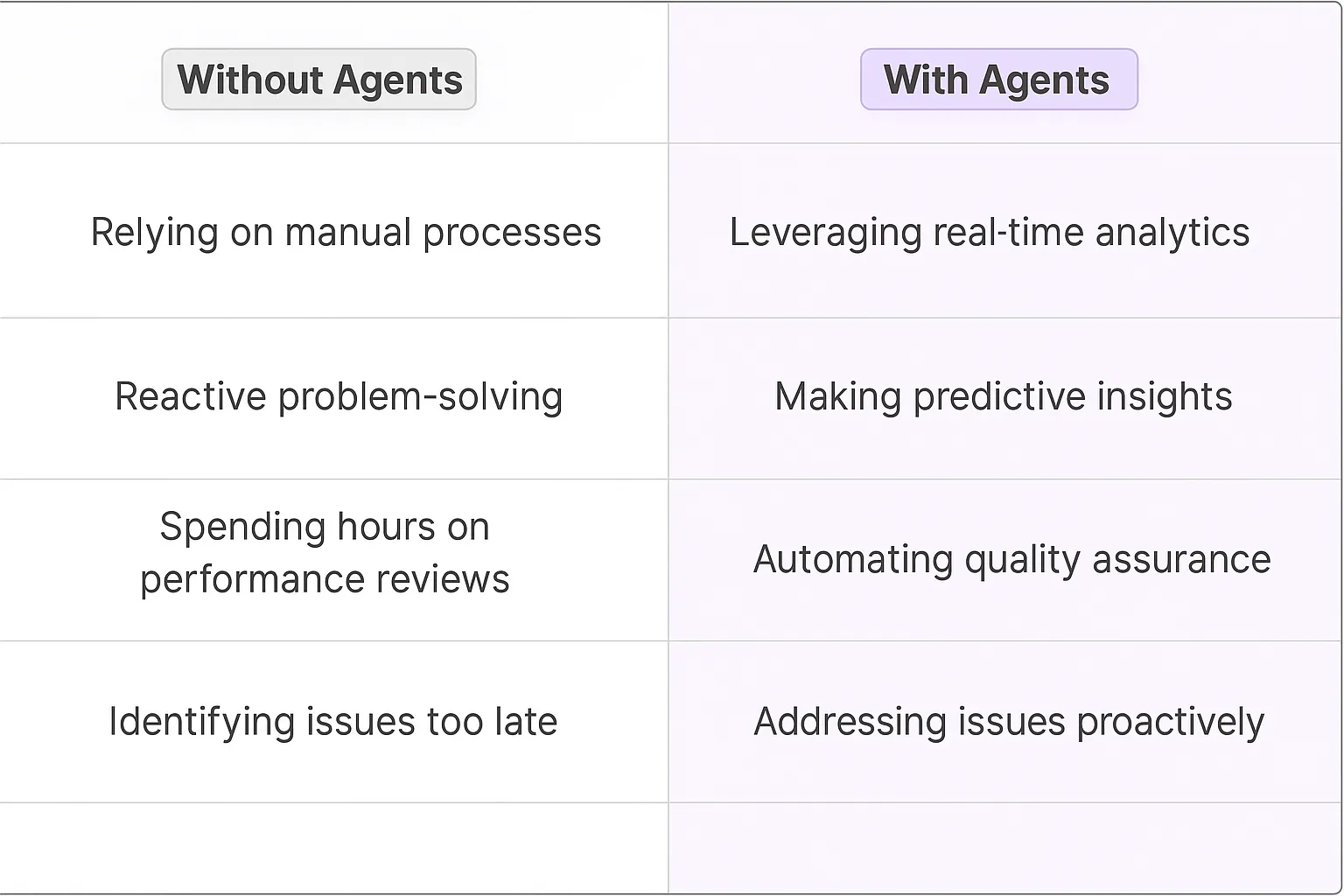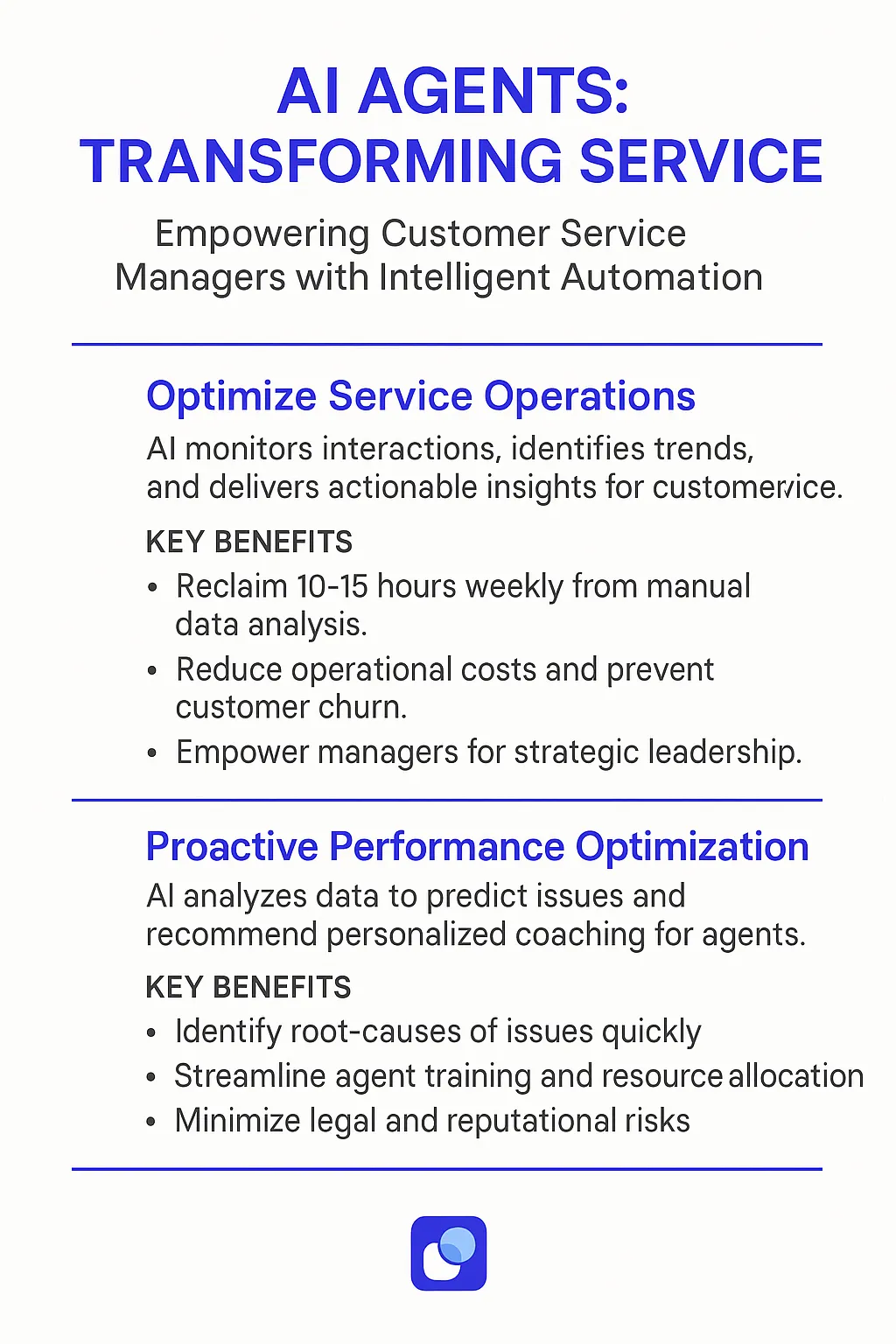Customer Service Manager is a cutting-edge software solution that leverages AI to transform customer service operations. It's not just another tool in the toolbox; it's a game-changing platform that acts as a digital teammate for customer service managers. This AI-powered system works tirelessly alongside human agents, handling complex data analysis, predictive modeling, and automated task management to elevate the entire customer service experience.

Before AI agents entered the scene, customer service managers were stuck in a world of spreadsheets, manual ticket routing, and endless training sessions. They'd spend hours poring over customer interaction logs, trying to piece together insights from fragmented data. The tools at their disposal were often clunky CRM systems that felt more like digital file cabinets than intelligent assistants.
Managers would rely on periodic team meetings and one-on-one coaching sessions to improve their team's performance. But let's be real - by the time they identified a trend or issue, it was often too late to make a meaningful impact on customer satisfaction scores.
Enter AI agents - the game-changers that are redefining what it means to manage a customer service team. These digital teammates are like having a brilliant analyst, coach, and strategist all rolled into one, working 24/7 to elevate your team's performance.
First off, AI agents are data analysis beasts. They can analyze thousands of customer interactions in real-time, spotting patterns and trends that would take a human manager weeks to uncover. This means you're always ahead of the curve, able to nip potential issues in the bud before they escalate into full-blown crises.
But it's not just about reactive problem-solving. These AI agents are proactive powerhouses. They can predict which customers are at risk of churning based on subtle cues in their communication patterns. Imagine being able to swoop in and save a customer relationship before they've even thought about leaving - that's the kind of superpower AI agents bring to the table.
Training and coaching? AI agents are transforming this space too. They can provide personalized coaching recommendations for each team member based on their individual performance metrics. It's like having a personal mentor for every agent on your team, continuously fine-tuning their skills and helping them level up.
Perhaps most importantly, AI agents free up managers to focus on what really matters - strategy and human connection. With AI handling the data analysis and routine tasks, managers can spend more time on high-level thinking and nurturing their team's growth. It's about augmenting human capabilities, not replacing them.
In essence, AI agents are turning customer service management from a reactive, often overwhelming job into a proactive, strategic role. They're not just tools; they're catalysts for a fundamental shift in how we approach customer service. And for managers willing to embrace this shift, the potential for driving unprecedented levels of customer satisfaction and team performance is enormous.

Customer service managers are constantly juggling multiple responsibilities, from overseeing support teams to ensuring customer satisfaction. AI agents can significantly enhance their capabilities, acting as digital teammates that augment human skills rather than replace them. Let's dive into some concrete ways these AI-powered tools can transform customer service management:
Beyond process optimization, AI agents can take on specific tasks that traditionally consume a significant portion of a customer service manager's time:
The integration of AI agents into customer service management isn't just about efficiency gains. It's about elevating the entire customer experience paradigm. These digital teammates enable managers to shift from reactive problem-solving to proactive strategy development. They provide the bandwidth for managers to focus on high-impact activities like team development, process innovation, and customer relationship building.
As we move forward, the most successful customer service managers will be those who effectively leverage AI to amplify their teams' capabilities. They'll use these tools not just to solve today's problems faster, but to anticipate and prevent tomorrow's challenges. The result? Happier customers, more engaged support teams, and a competitive edge in an increasingly service-driven economy.

AI agents are reshaping customer service management across sectors, and their impact is far from superficial. These digital teammates are becoming indispensable, handling tasks that once consumed hours of human effort. Let's dive into some concrete, industry-specific scenarios where AI agents are proving their worth in customer service management.
From e-commerce giants to healthcare providers, organizations are leveraging these AI-powered tools to transform their customer interactions. They're not just answering queries; they're predicting needs, personalizing experiences, and even influencing business strategies. The following use cases illustrate how AI agents are becoming the backbone of modern customer service operations, creating value that extends far beyond simple task automation.
The e-commerce landscape is cutthroat, and customer service can make or break a brand. Enter Customer Service Manager AI Agents – the secret weapon for online retailers looking to dominate the space.
Take Zappos, the online shoe and clothing retailer known for its fanatical customer service. Now, imagine if they deployed an army of AI-powered Customer Service Manager agents. These digital teammates would work tirelessly alongside human agents, handling the grunt work and freeing up humans to focus on high-touch interactions.
Here's where it gets interesting: These AI agents wouldn't just respond to queries. They'd proactively manage the entire customer service ecosystem. They'd analyze patterns in customer complaints, identify recurring issues, and flag potential product defects before they become PR nightmares. It's like having a thousand experienced CS managers working 24/7, but without the need for coffee breaks or vacation time.
But the real magic happens when you combine this with data. These AI agents could tap into a customer's purchase history, browsing behavior, and social media activity to personalize interactions at scale. Suddenly, every customer feels like they're getting white-glove treatment, even if they're just asking about a return policy.
The result? Dramatically reduced response times, increased customer satisfaction, and a serious edge over competitors still relying on traditional CS models. It's not just about answering questions faster – it's about transforming customer service from a cost center into a powerful driver of brand loyalty and repeat purchases.
For e-commerce players, this isn't just a nice-to-have. It's the difference between being the next Amazon and being the next Blockbuster. The companies that nail this will create an unbeatable moat in customer experience, leaving their competitors in the dust.
The hotel industry is ripe for disruption, and AI-powered Customer Service Manager agents are about to flip the script on hospitality. Let's dive into how this could play out at a major hotel chain like Marriott.
Marriott's been in the game for nearly a century, but even legacy players need to evolve or die. By deploying Customer Service Manager AI agents, they could create a 10x better guest experience while slashing operational costs.
These digital teammates would be the ultimate concierge, working 24/7 across all properties. They'd handle everything from room service orders to maintenance requests, but that's just table stakes. The real value comes from their ability to anticipate needs and solve problems before they happen.
Imagine an AI that notices a guest always orders extra towels. Next time, those towels are waiting in the room before check-in. Or an AI that spots a pattern of noise complaints in a specific wing and proactively offers guests in that area complimentary noise-canceling headphones.
But here's where it gets really interesting: These AI agents could tap into a guest's entire travel ecosystem. They'd know if your flight was delayed and automatically adjust your check-in time. They'd see you've been hitting the gym more often and suggest healthier room service options. It's like having a personal butler who knows you better than you know yourself.
The network effects here are insane. Every interaction makes the AI smarter, creating a flywheel of ever-improving service. Hotels that nail this will create an unbeatable moat in guest satisfaction, driving repeat bookings and word-of-mouth growth.
For hotel chains, this isn't just about cutting costs or improving service. It's about redefining what hospitality means in the 21st century. The players who get this right won't just be competing with other hotels – they'll be setting a new standard for personalized service that even luxury brands will struggle to match.
This is the kind of step-change innovation that separates the winners from the losers in any industry. In hospitality, it's the difference between being the next Airbnb and being the next Blockbuster. The race is on, and the stakes couldn't be higher.
Implementing a Customer Service Manager AI Agent isn't just about plugging in some fancy algorithm and watching the magic happen. It's a complex dance of data, infrastructure, and user experience that can make or break your customer service game.
First up, we're talking about serious data integration. Your AI needs to seamlessly tap into CRM systems, ticketing platforms, and knowledge bases. It's like trying to get a finicky eater to enjoy a five-course meal – each bite (or in this case, each data source) needs to be just right.
Then there's the natural language processing (NLP) hurdle. Your AI needs to understand the nuances of human communication, including sarcasm, context, and those pesky regional dialects. It's not just about recognizing words; it's about grasping intent. Think of it as teaching a robot to understand the difference between "I'm fine" when your partner says it versus when your boss does.
Let's not forget about scalability. Your AI needs to handle peak times without breaking a sweat. It's like building a theme park ride that can handle both a lazy Tuesday afternoon and the summer rush – without any line cutters or meltdowns.
On the operational front, we're entering a whole new world of workforce dynamics. Integrating AI into customer service isn't just a tech upgrade; it's a cultural shift that would make even the most seasoned change management guru sweat.
Training your human team to work alongside AI is crucial. It's not about replacing humans; it's about creating a symbiotic relationship. Think of it as teaching your team to dance with a partner who never gets tired, never needs a coffee break, but also can't improvise a sick day excuse.
Then there's the challenge of maintaining the human touch. Customers still crave that personal connection, even in our digital age. Your AI needs to know when to step back and let a human take the lead. It's like having a really efficient butler who knows exactly when to pour the tea and when to let you handle the delicate family conversations.
Lastly, we can't ignore the ethical considerations. Privacy concerns, data handling, and transparency in AI decision-making are not just buzzwords – they're the foundation of trust in this brave new world. It's about building an AI that's not just smart, but also trustworthy and ethical. Think of it as raising a digital child – you want it to be brilliant, but you also want it to have a strong moral compass.
Implementing a Customer Service Manager AI Agent is a journey filled with both exciting possibilities and daunting challenges. It's not for the faint of heart, but for those who pull it off, the rewards can be game-changing. Just remember, in this AI-powered customer service revolution, the goal isn't to create a world without humans – it's to create a world where humans and AI bring out the best in each other.
Customer Service Manager AI Agents are more than just a technological upgrade; they're a paradigm shift in how we approach customer service. By seamlessly integrating AI into customer service operations, businesses can unlock unprecedented levels of efficiency, personalization, and strategic insight. The companies that successfully harness this technology will create an unbeatable moat in customer experience, driving loyalty and growth in ways we've never seen before.
However, this transformation doesn't come without challenges. From technical hurdles like data integration and scalability to operational concerns around workforce dynamics and maintaining the human touch, implementing AI in customer service requires careful planning and execution. But for those who get it right, the rewards are immense. We're not just talking about incremental improvements; we're looking at a fundamental reimagining of what customer service can be.
As we move forward, the most successful businesses will be those that view AI as a powerful tool to enhance human capabilities. The future of customer service lies in creating a symbiotic relationship where AI and human ingenuity combine to create experiences that were once thought impossible. Welcome to the new frontier of customer service, where innovation drives unprecedented customer satisfaction and business success.